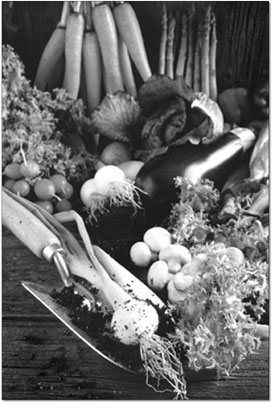| ||
You are where you eat
by Ari LeVaux The New Oxford American Dictionary recently named “locavore” its 2007 word of the year. Although the announcement, via the publisher’s blog, doesn’t actually contain a definition, we can surmise the meaning from the discussion of this year’s winning word. “The ‘locavore’ movement encourages consumers to buy from farmers’ markets or even to grow or pick their own food, arguing that fresh, local products are more nutritious and taste better. Locavores also shun supermarket offerings as an environmentally friendly measure, since shipping food over long distances often requires more fuel for transportation.” I was happy to learn about the linguistic triumph, as I’ve long been a fan of eating locally myself. But my bubble burst when I read a New York Times story that pooh-poohed the Word of the Year thing as a marketing gimmick to help dictionary publishers sell more dictionaries. Since most people don’t buy new dictionaries every year, dictionary publishers are scrambling to create buzz. It turns out that Merriam-Webster has a word of the year, too. Last year’s was “truthiness,” coined by Stephen Colbert on the maiden voyage of his show, “The Colbert Report.” On the Merriam-Webster Web page, you can vote from a list of 20 candidates for the 2007 word, and learn that truthiness won by a hefty 5:1 margin in last year’s contest. Unfortunately, for the competing hard-copy publishers, I think they are all being aced by the online Urban Dictionary (www.urbandictionary.com), which is kind of like a Wikipedia for new words and phrases, also known as slang. As if to prove my point, while I couldn’t find definitions for locavore on either the Oxford or Merriam-Webster Web sites, I finally scored with the Urban Dictionary. “Locavore: A person whose diet focuses on foods grown and produced nearby, typically 100 miles. See also 100-mile diet. ‘Robin wanted to be a locavore, so he only bought food that was grown on local farms.’” I also noticed another, similar word, localvore, and clicked for a definition. “Also called ‘culinarians,’ food activists, ecogastronomists, and refers to culinazis who advocate traditional local food-harvesting/-making methods (ecogastronomy/Slow Food/cuisine de terroir), in Third World countries and other authentic ‘food cultures’… .” The definition continues, but you get the point. It was mildly disturbing to read here essentially the same definition as for locavore, but cast in a negative light. And I had to wonder if I am in fact a culinazi. So I searched the Urban Dictionary for culinazi. “A culinazi is a culinary snob or extreme foodie. Refusing to eat at fast food or chain restaurants, the culinazi goes for the hole-in-the-wall establishments, like a taqueria for lengua gorditas or offal at a run down brasserie. Knowledgeable in food and sometimes wine, the culinazi doesn’t necessarily have to be involved in the restaurant industry. Fresh ingredients of the highest quality are what the culinazi brags of; knives and cookware are his tools. Buying locally to stimulate local farming and economic balance, and always looking for a culinary adventure are the name of the game for the culinazi. Stacks of books, memoirs, notes, magazines and newspaper articles fill the culinazi’s closets, bookshelves and garage…” Again, the definition goes on and on, followed by an example of usage: “Dude, that guy on table 3 is such a culinazi, he refuses to eat our farm-raised salmon.” Well, I guess I really am a culinazi. And, although I don’t appreciate the negative tone of the definition, it just goes to show that the evolution of language is truly a democratic process. In fact, Urban Dictionary surfers can vote with either a “thumbs up” or “thumbs down” on how much they like a particular word, of which there are currently thousands logged. I was satisfied to learn that more voters gave “culinazi” a thumbs down! To a verbavore like me, the Urban Dictionary is addictive (and thanks to National Public Radio’s Chrystie the Wordsmith for “verbavore”). Instead of making a big deal out of one Word of the Year, the Urban Dictionary has multiple new words every day (recent ones include compunicate, pre-sequitur, and Libby – a verb that describes what the Vice President’s aide did to Valerie Plame). Speaking of screwing, and, er, stuff, be warned – some of the Urban Dictionary’s words and definitions are graphic and shocking. Meanwhile, I’m working on a competing definition of locavore. My definition incorporates the movement quality of “locamotive,” and means something like: “someone who walks around eating.” Yep, however you define it, I’m a locavore. •
|


